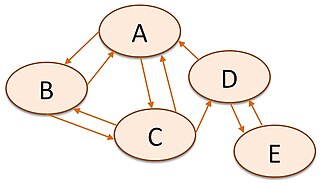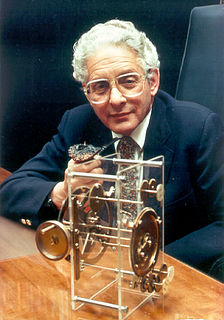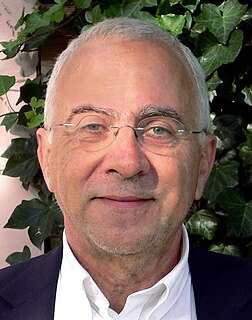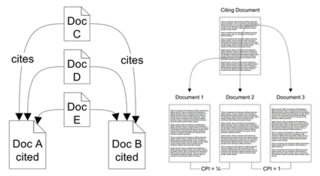A citation index is a kind of bibliographic index, an index of citations between publications, allowing the user to easily establish which later documents cite which earlier documents. A form of citation index is first found in 12th-century Hebrew religious literature. Legal citation indexes are found in the 18th century and were made popular by citators such as Shepard's Citations (1873). In 1960, Eugene Garfield's Institute for Scientific Information (ISI) introduced the first citation index for papers published in academic journals, first the Science Citation Index (SCI), and later the Social Sciences Citation Index (SSCI) and the Arts and Humanities Citation Index (AHCI). The first automated citation indexing was done by CiteSeer in 1997 and was patented. Other sources for such data include Google Scholar and Elsevier's Scopus.

The science of webometrics tries to measure the World Wide Web to get knowledge about the number and types of hyperlinks, structure of the World Wide Web and usage patterns. According to Björneborn and Ingwersen, the definition of webometrics is "the study of the quantitative aspects of the construction and use of information resources, structures and technologies on the Web drawing on bibliometric and informetric approaches." The term webometrics was first coined by Almind and Ingwersen (1997). A second definition of webometrics has also been introduced, "the study of web-based content with primarily quantitative methods for social science research goals using techniques that are not specific to one field of study", which emphasizes the development of applied methods for use in the wider social sciences. The purpose of this alternative definition was to help publicize appropriate methods outside of the information science discipline rather than to replace the original definition within information science.

Bibliometrics is the use of statistical methods to analyse books, articles and other publications. Bibliometric methods are frequently used in the field of library and information science. The sub-field of bibliometrics which concerns itself with the analysis of scientific publications is called scientometrics. Citation analysis is a commonly used bibliometric method which is based on constructing the citation graph, a network or graph representation of the citations between documents. Many research fields use bibliometric methods to explore the impact of their field, the impact of a set of researchers, the impact of a particular paper, or to identify particularly impactful papers within a specific field of research. Bibliometrics also has a wide range of other applications, such as in descriptive linguistics, the development of thesauri, and evaluation of reader usage.

Derek John de Solla Price was a British physicist, historian of science, and information scientist, credited as the father of scientometrics.
Scientometrics is the field of study which concerns itself with measuring and analysing scholarly literature. Scientometrics is a sub-field of bibliometrics. Major research issues include the measurement of the impact of research papers and academic journals, the understanding of scientific citations, and the use of such measurements in policy and management contexts. In practice there is a significant overlap between scientometrics and other scientific fields such as information systems, information science, science of science policy, sociology of science, and metascience. Critics have argued that over-reliance on scientometrics has created a system of perverse incentives, producing a publish or perish environment that leads to low quality research.

Google Scholar is a freely accessible web search engine that indexes the full text or metadata of scholarly literature across an array of publishing formats and disciplines. Released in beta in November 2004, the Google Scholar index includes most peer-reviewed online academic journals and books, conference papers, theses and dissertations, preprints, abstracts, technical reports, and other scholarly literature, including court opinions and patents. While Google does not publish the size of Google Scholar's database, scientometric researchers estimated it to contain roughly 389 million documents including articles, citations and patents making it the world's largest academic search engine in January 2018. Previously, the size was estimated at 160 million documents as of May 2014. An earlier statistical estimate published in PLOS ONE using a Mark and recapture method estimated approximately 80–90% coverage of all articles published in English with an estimate of 100 million. This estimate also determined how many documents were freely available on the web.
Informetrics is the study of quantitative aspects of information. This includes the production, dissemination, and use of all forms of information, regardless of its form or origin. Informetrics encompasses the following fields:
Howard D. White is a scientist in library and information science with a focus on informetrics and scientometrics.
Bibliographic coupling, like co-citation, is a similarity measure that uses citation analysis to establish a similarity relationship between documents. Bibliographic coupling occurs when two works reference a common third work in their bibliographies. It is an indication that a probability exists that the two works treat a related subject matter.
The h-index is an author-level metric that measures both the productivity and citation impact of the publications of a scientist or scholar. The h-index correlates with obvious success indicators such as winning the Nobel Prize, being accepted for research fellowships and holding positions at top universities. The index is based on the set of the scientist's most cited papers and the number of citations that they have received in other publications. The index can also be applied to the productivity and impact of a scholarly journal as well as a group of scientists, such as a department or university or country. The index was suggested in 2005 by Jorge E. Hirsch, a physicist at UC San Diego, as a tool for determining theoretical physicists' relative quality and is sometimes called the Hirsch index or Hirsch number.
Journal ranking is widely used in academic circles in the evaluation of an academic journal's impact and quality. Journal rankings are intended to reflect the place of a journal within its field, the relative difficulty of being published in that journal, and the prestige associated with it. They have been introduced as official research evaluation tools in several countries.

Louis André (Loet) Leydesdorff (born 21 August 1948 in Djakarta is a Dutch sociologist, cyberneticist and Professor in the Dynamics of Scientific Communication and Technological Innovation at the University of Amsterdam. He is known for his work in the sociology of communication and innovation, especially for his Triple helix model of innovation developed with Henry Etzkowitz in the 1990s.
A library and information scientist, also known as a library scholar, is a researcher or academic who specializes in the field of library and information science and often participates in scholarly writing about and related to library and information science. A library and information scientist is neither limited to any one subfield of library and information science nor any one particular type of library. These scientists come from all information-related sectors.

Co-citation, like Bibliographic Coupling, is a semantic similarity measure for documents that makes use of citation relationships. Co-citation is defined as the frequency with which two documents are cited together by other documents. If at least one other document cites two documents in common these documents are said to be co-cited. The more co-citations two documents receive, the higher their co-citation strength, and the more likely they are semantically related.

Co-citation Proximity Analysis or CPA is a document similarity measure that uses citation analysis to assess semantic similarity between documents at both the global document level as well as at individual section-level. The similarity measure builds on the co-citation analysis approach, but differs in that it exploits the information implied in the placement of citations within the full-texts of documents.
There are a number of approaches to ranking academic publishing groups and publishers. Rankings rely on subjective impressions by the scholarly community, on analyses of prize winners of scientific associations, discipline, a publisher's reputation, and its impact factor.

Serbian Citation Index is a combination of an online multidisciplinary bibliographic database, a national citation index, an Open Access full-text journal repository and an electronic publishing platform. It is produced and maintained by the Centre for Evaluation in Education and Science (CEON/CEES), based in Belgrade, Serbia. In July 2017, it indexed 230 Serbian scholarly journals in all areas of science and contained more than 80,000 bibliographic records and more than one million bibliographic references.
Wolfgang Joachim Emil Glänzel is a German statistician who is a full professor at KU Leuven, where he is also the director of the Centre for R&D Monitoring. In 1999, he and Henk Moed received the Derek de Solla Price Memorial Medal from the International Society for Scientometrics and Informetrics (ISSI). Currently, he is the editor-in-chief of Scientometrics, as well as secretary-treasurer of the ISSI.

Ronald Rousseau is a Belgian mathematician and information scientist. He has obtained an international reputation for his research on indicators and citation analysis in the fields of bibliometrics and scientometrics.
The Derek de Solla Price Memorial Award, or Price Medal, was conceived to honor Derek J. de Solla Price for his contributions to information science and for his crucial role in developing the field of scientometrics. The award was launched by Tibor Braun, founder of the international journal Scientometrics, and is periodically awarded by the journal to scientists with outstanding contributions to the fields of quantitative studies of science. The awarding ceremony is part of the annual ISSI conference. The first medal was awarded to Eugene Garfield in 1984. The full list of winners can be found below.







